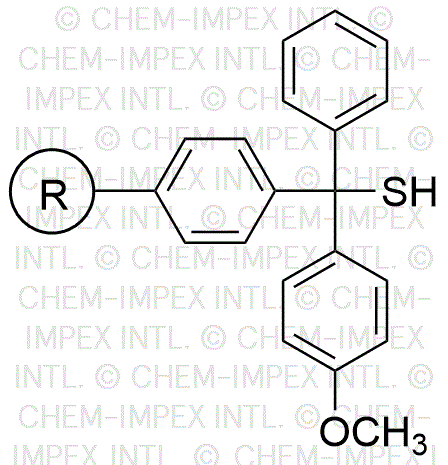Thiol 4-methoxy trityl resin is widely utilized in research focused on:
- Peptide Synthesis: This resin serves as a solid support for synthesizing peptides through solid-phase peptide synthesis (SPPS), allowing for efficient and high-yield production of complex peptides.
- Drug Development: In pharmaceutical research, it is used to create peptide-based drugs, enabling the exploration of new therapeutic agents with improved efficacy and specificity.
- Bioconjugation: The resin facilitates the attachment of biomolecules, such as antibodies or enzymes, to create bioconjugates for targeted drug delivery systems, enhancing the effectiveness of treatments.
- Analytical Chemistry: It is employed in the purification and isolation of specific compounds, aiding researchers in obtaining pure samples for further analysis and characterization.
- Material Science: This resin can be utilized in the development of novel materials, such as sensors or catalysts, due to its unique chemical properties and functionalization capabilities.
General Information
Properties
Safety and Regulations
Applications
Thiol 4-methoxy trityl resin is widely utilized in research focused on:
- Peptide Synthesis: This resin serves as a solid support for synthesizing peptides through solid-phase peptide synthesis (SPPS), allowing for efficient and high-yield production of complex peptides.
- Drug Development: In pharmaceutical research, it is used to create peptide-based drugs, enabling the exploration of new therapeutic agents with improved efficacy and specificity.
- Bioconjugation: The resin facilitates the attachment of biomolecules, such as antibodies or enzymes, to create bioconjugates for targeted drug delivery systems, enhancing the effectiveness of treatments.
- Analytical Chemistry: It is employed in the purification and isolation of specific compounds, aiding researchers in obtaining pure samples for further analysis and characterization.
- Material Science: This resin can be utilized in the development of novel materials, such as sensors or catalysts, due to its unique chemical properties and functionalization capabilities.
Documents
Safety Data Sheets (SDS)
The SDS provides comprehensive safety information on handling, storage, and disposal of the product.
Product Specification (PS)
The PS provides a comprehensive breakdown of the product’s properties, including chemical composition, physical state, purity, and storage requirements. It also details acceptable quality ranges and the product's intended applications.
Certificates of Analysis (COA)
Search for Certificates of Analysis (COA) by entering the products Lot Number. Lot and Batch Numbers can be found on a product’s label following the words ‘Lot’ or ‘Batch’.
*Catalog Number
*Lot Number
Certificates Of Origin (COO)
This COO confirms the country where the product was manufactured, and also details the materials and components used in it and whether it is derived from natural, synthetic, or other specific sources. This certificate may be required for customs, trade, and regulatory compliance.
*Catalog Number
*Lot Number
Safety Data Sheets (SDS)
The SDS provides comprehensive safety information on handling, storage, and disposal of the product.
DownloadProduct Specification (PS)
The PS provides a comprehensive breakdown of the product’s properties, including chemical composition, physical state, purity, and storage requirements. It also details acceptable quality ranges and the product's intended applications.
DownloadCertificates of Analysis (COA)
Search for Certificates of Analysis (COA) by entering the products Lot Number. Lot and Batch Numbers can be found on a product’s label following the words ‘Lot’ or ‘Batch’.
*Catalog Number
*Lot Number
Certificates Of Origin (COO)
This COO confirms the country where the product was manufactured, and also details the materials and components used in it and whether it is derived from natural, synthetic, or other specific sources. This certificate may be required for customs, trade, and regulatory compliance.


